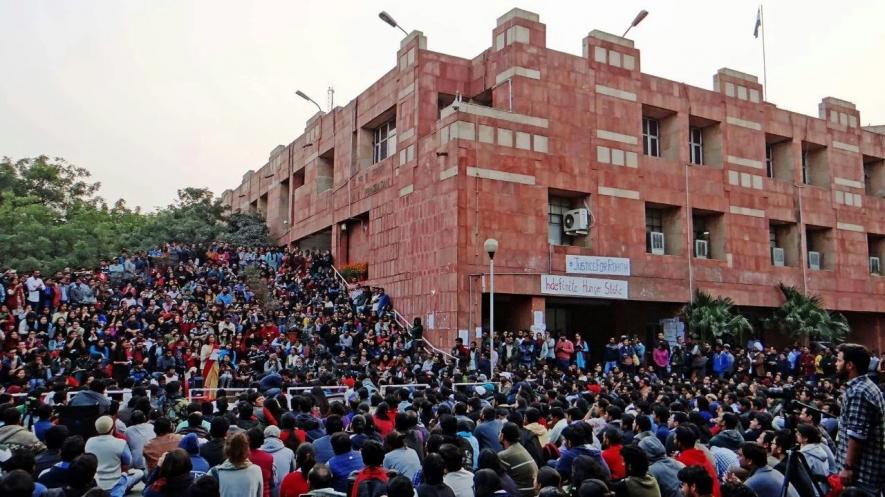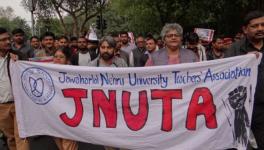Return of Sexual Harassment Accused Atul Johri to JNU Exposes Cracks in ICC

The arrest of Johri, his subsequent release, and now, his return to campus brings to the limelight a long pending discussion of safety for female students in campuses.
Atul Johri, the tainted JNU professor, who is facing sexual harassment charges is now being allowed to access his room and laboratory by the JNU administration. The decision was taken at the 278th meeting of the university’s Executive Council held on February 15, in which the members of the Academic Council were not even allowed to participate.
In March last year, at least eight women accused Johri, professor at JNU’s School of Life Sciences (SLS), of sexual harassment, leading to his arrest and subsequent bail. In an earlier petition filed by the students against him, they had demanded his restrictive movement on campus. However, now the administration has gone ahead and withdrawn the restrictions. The move comes after the ICC had given a clean chit to the professor in August, blatantly encouraging punitive action against the complainant instead of protecting her. While submitting its report to the High Court, the committee instead stated that he posed “no threat” to the complainants, and instead it was the complainants, along with others, who had threatened Johri and his family.
The arrest of Johri, his subsequent release, and now, his return to campus brings to the limelight a long pending discussion of safety for female students in campuses. More importantly, the case raises the question of lack of accountability of the administration against perpetrators of sexual harassment on campuses and the failure of the ICC as effective mechanism.
Also Read: JNU Students Launch #SuspendJohri Campaign Against Professor Accused of Sexual Harassment
Dipsita Dhar, All India Joint Secretary of the Students’ Federation of India and a student at JNU, said, “From the behaviour of the ICC, a very clear message is being sent out to female students—that the situation is only going to worsen for women who would want to come out and file complaints against harassers, and that if they speak up, there can be punitive action against them.”
Dhar added, “In ICC, the onus is on the complainant to prove that she is telling the truth. In contrast, the independent GSCASH (Gender Sensitisation Committee Against Sexual Harassment) ensures that the onus is actually on the accused to prove he is not guilty. This assumption of guilt is a key facet in determining how the case turns out.”
The GSCASH, which was constituted after years of sustained and united struggle by students, teachers and other sections of the JNU community, was illegally removed by the current Vice Chancellor of JNU, Prof. Mamidala Jagadeesh Kumar in 2017. The GSCASH, in addition to adjudicating cases of sexual harassment, would also actively organise workshops to enable conversations surrounding such issues in the campus.
Srabani Chakraborty, former student representative of GSCASH, calling his return a travesty of justice, told NewsClick, “The first response to the complaint should have been to provide help to the complainant and to ensure that she feels safe. The Internal Complaints Committee did not do anything or take suo motu cognisance of the case. The ICC operates under the authority of the administration, with members from the administration yielding power over the process of the committee.”
She added, “Atul Johri was always on campus. There was a petition to ensure his movement is restricted and he does not come to classes, or labs. That order has been taken back by the administration.” However, the students are not backing down.
Dipsita added, “We are planning flash protests against Johri. We have also been actively postering to make sure that the administration knows in the strongest words that this is not acceptable.”
Srabani added, “The legal process against his return is ongoing as we have challenged the ICC finding and the High Court has sought a response over it. The matter will be heard on May 3.”
Around 1,500 women students of Jawaharlal Nehru University have petitioned President Ram Nath Kovind, also the Visitor of the university, asking him to “intervene” in the functioning of the Internal Complaints Committee (ICC) and reinstate the erstwhile GSCASH.
Read More: JNU’s Internal Complaints Committee: A Mockery of Gender Justice!
Get the latest reports & analysis with people's perspective on Protests, movements & deep analytical videos, discussions of the current affairs in your Telegram app. Subscribe to NewsClick's Telegram channel & get Real-Time updates on stories, as they get published on our website.
























